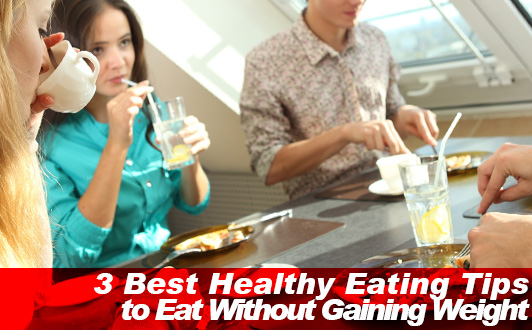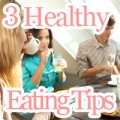
Although you are used to hearing about weight gain being related to lifestyle habits and genetics, there are still people who can eat without gaining weight and those that well… Just keep on eating another plate despite damage it does in weight loss.
YOU ARE WHAT YOU EAT
What foods can you eat without getting fat? - Let's discuss some healthy eating tips you can apply to eat without gaining weight.
- Health eating tips
- Sequential eating order
- Chew your food
- How many meals a day?
- Avoid eating late
- Stop multitasking while eating
- Low gi foods
3 Tips for People Wanting To Know How to Not Gain Weight
The main reason why people gain weight has to do with energy balance. That is the balance between the energy intakes of the food you eat with the energy expenditure of what you put out exercises added to your metabolism. What is left over has to other choice but to be stored away in your body as fat.
Muscle and your metabolism
Energy expenditure depends much on muscle mass and level of physical activity. For people with less muscle on their body, less energy is spent outside of exercise often resulting in excess energy being stored away as fat. This describes someone who gains what they eat.
On the other hand people with more muscle mass are said to be able to eat without getting fat. Due to the fact that they are moving their bodies around more, dieters hate them. They don't get fat even after eating those sugary sweets.
1. Sequential eating order to fill your stomach
Eating only one type of food is not how to eat. In order to get the best out of your diet there eating foods in the right order may help you prevent overeating. The following sequential eating order is said to work great in overeating prevention giving you what you need to get full eating less.
DIETARY FIBER (VEGETABLES / SEAWEED / MUSHROOMS / ETC)
↓
PROTEIN (FISH / MEATS /.ETC)
↓
CARBOHYDRATE (RICE / NOODLES / BREAD /. ETC)
Soup makes a good source of dietary fiber and protein. Start your meal off eating vegetables to give you the fiber your need to soak up water content in your stomach producing a filling effect. This could help to reduce food intake naturally while dampening down on the negative side of blood sugar increase.
2. How to eat healthy and lose weight
There are a lot of thing you have to watch out for eating on a diet. Following these rules can make the difference between gaining weight and getting fat, and maintaining your weight slowing inching towards achieving your ideal body weight. Here are some seeds of wisdom you can chew on while eating to boost your diet.
1) Chew your food, eat slow
Although it may feel like common sense when it comes to dieting, chewing your food more when you eat can reduce food intake and pin down your appetite. Simply spending more time with each bite your make chewing as much as 30 times before moving on next is all it takes. This causes the level of glucose and histamine in your body to rise effectively controlling your appetite.
Preferably while increasing the number of times you chew your food, you are going to want to work on your eating speed. People who eat fast in particular, have been shown to a high risk of becoming obese than people who eat at a normal pace when eating. People that eat too fast give their body less time to adjust to eating making it easier to overeat.
2) Number of meals per day
If you diet is telling you all you've got to do to lose weight is not eat, that's not a diet. Choosing the wrong diet is making the wrong turn in your health. Trying to lose weight on a diet not eating is a quick way to lose muscle slowing down your metabolism and possibly putting you on the rebound looking for a diet that actually works.
Eating 3 meals a day while holding back on late night eating is a good rule of thumb to go by. Eating the same amount each meal only ends up in eating too many calories and not burning it off sending that energy to your fat stores right way.
3) Watch out for what time you eat (Stop eating late at night)
When it comes to when to eat food, eating 3 meals a day is an old standstill you can go by. However for people leading stretched out busy lives there is always an excuse. That still doesn't change the fact that the time you chose to eat is an important matter. So when is it that most dieters need the most help?
Most people are area of the fact that eating late at night is going to make you fat. Studies have confirmed this fact.
BMAL1
When you eat late at night the protein BMAL1 one is high in your body that plays a role in the creation of fat cells in your body as well increasing the amount of enzymes that are absorbed from the foods you eat.
Between 10PM and 2AM, BMAL1 levels in your body are the highest. During this time, your metabolism is slowed down and more likely to commit excess energy to your fat stores. That is why eating before this time is critical for succeeding in your diet.
Eating right before you go to bed is not an eating habit you want to have while dieting. If you have to eat late, the best you can do is eat 2-3 hours before going to bed.
4) Quit multitasking while you eat
Multitasking while you exercise is okay. However, eating while watching TV, talking on your cellphone, reading the newspaper, etc. is not going to help you lose weight. Being preoccupied with something else while you eat makes you vulnerable to forget about how to eat for weight loss.
The fact is that when eating you need you undivided attention towards eating right. That entails slowly chewing your food spending more time eating to get full eating less.
3. Make healthier choices eating low gi foods
What comes to mind when thinking about foods that won't make you fat are foods that you can eat without a blood sugar increase shooting insulin levels in your body up causing your body to store away fat like there is no tomorrow.
Despite what you eat, an increase in blood sugar level is a given. However eating low gi foods can delay the increase of blood sugar resulting in less insulin used by your body to keep you blood sugar down.
Eating low gi foods is great for people with diabetes but that still doesn't mean you still don't have to worry about overeating. Even though you are eating low gi foods, the rules to dieting don't change. Keep that in mind as you eat without gaining weight.





